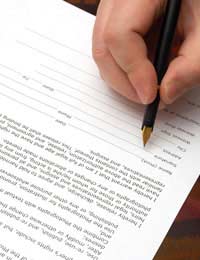Other Types of Trust

While there are a large number of trust types available to potential settlors under English law, perhaps understandably a small group tend to be used more frequently than others. This is clearly because many individuals wish to establish trusts for similar reasons; these most often include estate planning or financial provision for dependants. However, in certain circumstances more esoteric trust types may better suit the situation.
Fixed Trusts
Fixed trusts are a potentially useful solution for situations in which the settlor wishes for their estate to be disbursed to a number of beneficiaries in certain proportions. In these cases the trustees have no discretion regarding the amount that is to be disbursed, to whom it is to be disbursed, or when. Rather, the terms of the trust are set in advance by the settlor.The defining characteristic of a fixed trust is that the settlor pre-determines the proportion of the assets placed in trust that will be disbursed to each beneficiary. It is important to note that the value of these assets need not be known. In fact, it is frequently impossible to predict this value; fixed trusts are often funded with shares, the price of which obviously fluctuates.
Discretionary Trusts
In contrast to fixed trusts, discretionary trusts offer significant freedom to the trustees. Under these arrangements, the trustees can exercise their discretion regarding the amount to be disbursed, the timing of the disbursal and, in some cases, whether or not assets should be transferred to individual beneficiaries at all. Frequently the settlor will provide guidance to the trustees to explain their intentions. This normally takes the form of a ‘letter of wishes’. This is not, however, legally binding upon the trustees; rather, it is considered to be a statement of intent to which the trustees should refer when making decisions regarding the management of the trust and its assets.Hybrid Trusts
Hybrid trusts are more complex. The terms of these trusts are designed to ensure that they can adapt to suit any unforeseen situation, be that a change in family circumstances or the tax schedule. Hybrid trusts offer trustees as much power as they would be granted in a straightforward discretionary trust, but combine this with other trust types as a ‘stop-gap’ measure.A hybrid trust might, for example, state that the trustees should decide on the ultimate disbursement of the assets but, until that time, it should take on the character of an interest in possession trust; thus, the income generated by the trust should be paid to a particular individual until such time as the trustees make a decision.
During this period, however, the trustees have the power to change the individual to whom the income is being paid. Alternatively, if the hybrid trust takes on the character of an accumulation and maintenance trust until the trustees make their own decision, maintenance payments will be paid to the relevant individual until they reach a specified age.
‘Stock’ trust documents are frequently inefficient, particularly if the settlor’s affairs are particularly complex. As such, it is worth investigating some of the less frequently used trust types to investigate their potential.
- Implied and Express Trusts
- Revocable and Irrevocable Trusts
- When is a Trust Public or Private?
- When is a Trust Constructive?
- When Would I Use an Interest in Possession Trust?
- Accumulation and Maintenance and Mixed Trusts
- When Would I Use a Discretionary Trust?
- What is a Bare Trust?
- Incentive Trusts: Encouraging Responsibility


Re: How to Trace Whereabouts of Trust Funds?
I was involved in a car accident when I was younger and I’m now 18 and I was awarded £3,000 and my parents cannot…
Re: How to Trace Whereabouts of Trust Funds?
I’m trying to locate details of a trust fund which was left by my younger brother with my parents being the…
Re: Revocable and Irrevocable Trusts
I have trust but my step brother went behind my dad back and change the final trust. Now he refuses to tell us if the trust…
Re: How to Trace Whereabouts of Trust Funds?
Hi I am looking for a trust fund,that I think my dad left is half of the house in ,my step mother didn't go into…
Re: Can Conditions Be Put Into Adult Children's Trust Funds?
Hi, can you help. my father was killed in a road accident in October 1966. My grandfather…
Re: Reasons for Establishing a Living Trust
are there any inheritance tax ramifications when creating a 'living trust'.
Re: What is Absolute Entitlement?
My mother’s will has the word absolutely after each beneficiary name. My sister has died since but the estate has been delayed…
Re: Implied and Express Trusts
My father (ZML) and stepmother (JNL) wrote joint wills which each contained a testamentary trust. I was named executor and trustee.…
Re: How to Trace Whereabouts of Trust Funds?
Hello i am trying to locate a trust that i think my mother is hiding from me
Re: How to Trace Whereabouts of Trust Funds?
Hello i am trying to locate a trust that my mother is hiding from me